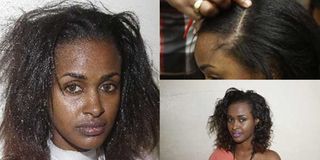Effective home remedy for dandruff

What drew you to your partner? Was it their looks or was it their character? Whatever it was, be aware that someone else has noticed these attractive qualities, and maybe much more.
PHOTO/MARTIN MUKANGU
What you need to know:
Not washing your hair regularly, something that causes a build-up of oils and dead skin cells on the scalp.
Not oiling your scalp often to keep it moisturised. This makes the scalp dry and itchy.
Use of hair extensions. These can trigger allergies, which in turn cause excessive itching, and dandruff thereafter.
Dandruff is harmless, but it is unsightly and embarrassing. It is a common scalp condition, characterised by excessive production and peeling of the skin cells on the scalp. The scalp might also become itchy and dry.
The skin on the scalp peels off constantly (every four weeks) to get rid of dead skin cells. The tendency to have dandruff is not genetic, though the cause, such as eczema, can be inherited. You cannot get dandruff from someone who has it.
What causes it?
Not washing your hair regularly, something that causes a build-up of oils and dead skin cells on the scalp.
Not oiling your scalp often to keep it moisturised. This makes the scalp dry and itchy.
Use of hair extensions. These can trigger allergies, which in turn cause excessive itching, and dandruff thereafter.
Reaction to certain hair care products, causing an itchy, red, and scaling scalp.
Certain skin conditions can also cause dandruff. According to Dr Wanyika H.W, a consultant dermatologist, dandruff that refuses to go away with regular washing and normal moisturising could be due to a disease such as eczema, or psoriasis, an accumulation of skin cells that cause formation of scales and itchy, dry patches on the scalp.
The good news is that dandruff can easily be controlled at home by following these steps:
Shampoo your hair regularly, at least once every four weeks, to lessen oiliness and build-up of skin cells.
Oily hair creates a favourable environment for dandruff to thrive, therefore regular hair washing may help control itching and flaking. Gently massage your scalp using a mild shampoo, and avoid scrubbing the scalp too hard, since doing so can damage it.
Ensure that you rinse out the shampoo well. Using harsh hair shampoos can dry out the scalp and cause dandruff. If using an anti-dandruff shampoo, massage it into the scalp and leave it for about five minutes to allow it ample time to work. However, anti-dandruff shampoo should not be used more than once a week. Overuse can damage your hair.
Avoid, or limit the use of hair styling products, such as gels and hairsprays. Excessive use can make the scalp dry, leading to flaking. If using a new hair product, and you notice dandruff, stop using it, since it could be the cause.
Also, avoid using hair products that you might be allergic to. Some hair products contain ingredients such as sulphur, which can irritate the scalp, dry it out, and cause more dandruff. Look at the ingredients used before buying hair products.
If hair extensions make you itch, or trigger any other negative reaction, avoid them.
Comb your hair regularly. This helps to brush out dead cells.
Moisturise/oil your scalp often. You can do this by gently massaging hair oil into the scalp.
If the dandruff does not go away even after all this intervention, see a dermatologist for proper diagnosis. This is especially advisable if you have dandruff that is accompanied by red and swollen patches, hair loss or a persistent itch.



